All sugar substitutes are not created alike! We’ve got the breakdown on the best keto sweeteners — learn which low carb sweeteners taste the best, are the best value, and don’t have side effects. Plus, which sugar alternatives to avoid!
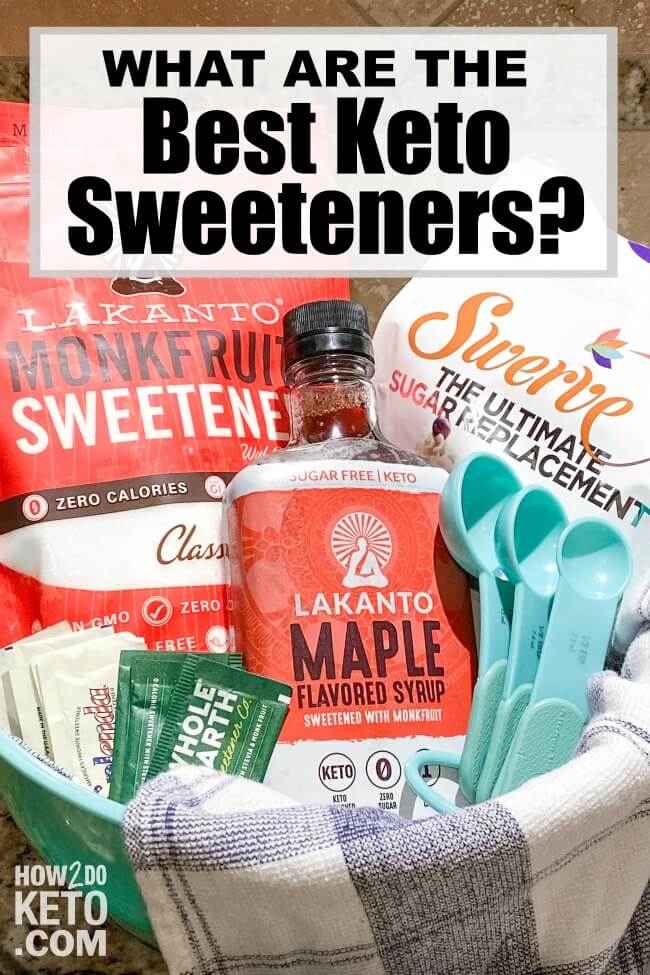
What is the Best Keto Sweetener?
If you’re new to the keto diet, you might be wondering what your options are to use in place of sugar. Many keto recipes will suggest a specific sugar substitute in the ingredients list, but how do you know if that is the best option?
We’ve tried and tested many popular keto sweeteners currently on the market and are sharing our findings with you here.
These are the four main criteria we looked at when choosing the best keto sweetener:
- Calories — While calories aren’t the number one consideration on keto, a low or zero calorie option is still ideal when trying to lose weight.
- Net carbs — This is the magic number on keto!
- Ingredients — It’s always important to know exactly what you’re consuming! Some sweeteners are one naturally-derived ingredient, while others are a blend.
- Cost — Sugar substitutes generally cost more than sugar itself. However, newer keto sweetener options or those that are more difficult to produce will be pricier than those that have been on the market for decades and readily available. See below for more information about our pricing guidelines.
Our Cost Estimates:
- Low – Less than $0.60 per ounce
- Moderate – $0.61 – $0.99 per ounce
- High – Greater than $1.00 per ounce
Note: We provide cost estimates to give you a general idea of the price range for each low carb sweetener in comparison to each other. These numbers are based on what we’ve seen at online retailers and may vary with the price you find both online and in stores. Actual prices are subject to change without our knowledge, so please keep in mind that these are only estimates.
Keto Friendly Sweeteners: The Breakdown
In our breakdown of each keto sweetener, we’ll also let you know if we noticed any aftertaste (or not) as well as any potential side effects.
Of course, taste is subjective and side effects may vary from person to person. However, we hope this list of low carb sweeteners is helpful when you’re shopping! We’ve included shop-able links to some of the products we love and use; read our disclosure policy here.
Here’s a look at all of the sweeteners we reviewed, compared to each other. A full breakdown of each sugar substitute is below the chart.
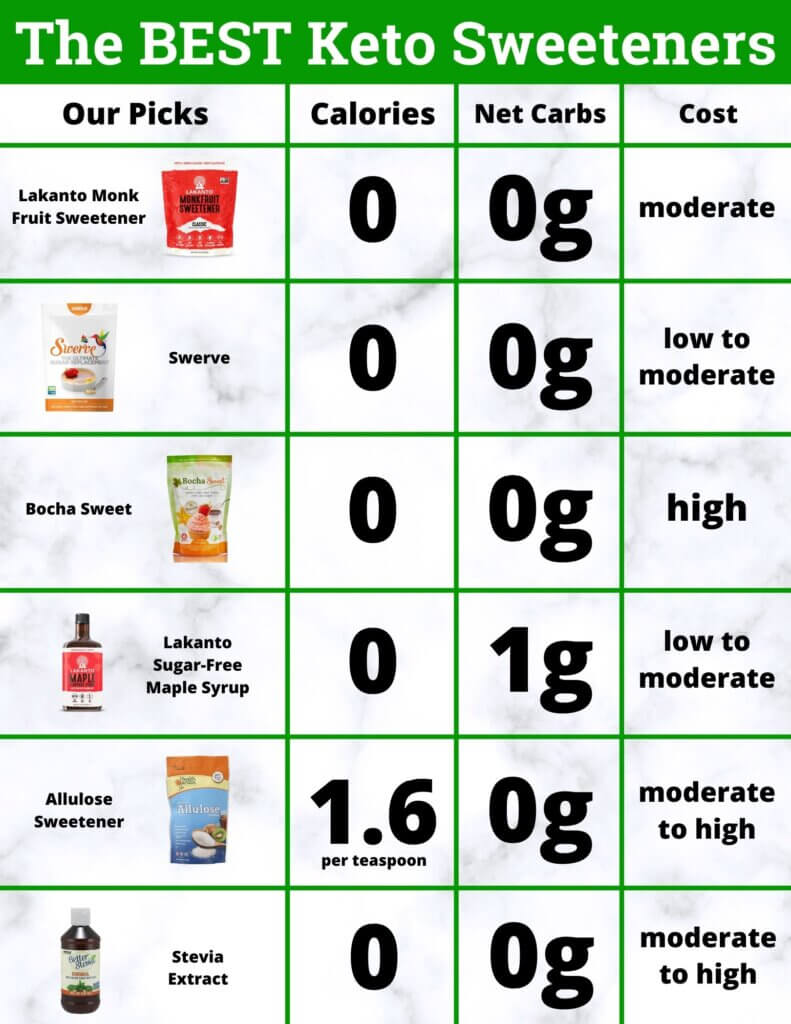
Our Pick for Best Keto Sweetener: Monk Fruit Sweetener
A relative newcomer to the sugar substitute scene, monk fruit extract was approved by the FDA for use as a sweetener in 2010. Pure monk fruit extract is about 200 times sweeter than sugar, so some manufacturers blend it with other sugar free sweeteners, such as erythritol for easier use in cooking and baking. 1
Why We Love It: Monk fruit sweetener contains zero calories and is naturally derived. It’s even thought to contain antioxidants, which may provide additional health benefits.
Unlike some sugar substitutes, monk fruit sweeteners don’t have an aftertaste or serious gastrointestinal side effects. Monk fruit is a great way to satisfy your sweet tooth, without the calories of real sugar or the yucky side effects of other alternatives.
That’s why our choice for the best keto sweetener is monk fruit!
 Try This: Lakanto Monk Fruit Sweetener
Try This: Lakanto Monk Fruit Sweetener
Lakanto’s Monk Fruit sweetener is a 1:1 replacement for sugar, so it’s easy to swap in recipes. As an added bonus, it is also vegan and diabetic-friendly!
Lakanto’s Monk Fruit sweetener is a blend containing erythritol, but the monk fruit sweetness really gives it the best overall taste and wins it the top spot in our list!
The Breakdown on Lakanto Monk Fruit Sweetener:
- Calories – 0
- Net Carbs – 0g
- What it’s made of – Erythritol, monk fruit extract
- Estimated Cost – Moderate
Our Runner-Up for Best Keto Sweetener: Erythritol
Erythritol is a sugar alcohol that occurs naturally in many fruits and vegetables. It can also be commercially produced through a fermentation process.2
Unlike other sugar alcohols such as maltitol or sorbitol, erythritol is better tolerated by the body and less likely to cause unpleasant digestive side effects.
Taste-wise, erythritol is slightly less sweet than sugar, but does not have an aftertaste like some other low carb sweeteners.
- Try This: Swerve
Swerve earns the runner-up spot in our list of best keto sweeteners because it tastes great, measures easily, and generally does not produce unpleasant side effects.
In addition to the granulated formula (pictured above), Swerve also has confectioner’s sugar and brown sugar substitute varieties. They can be used as a one to one substitute for sugar in recipes.
The Breakdown on Swerve Sugar Replacement:
- Calories – 0
- Net Carbs – 0g
- What it’s made of – Erythritol, oligosaccharides, natural flavors
- Estimated Cost – Low – moderate
The Best of the Rest – More of our Favorite Keto Sweeteners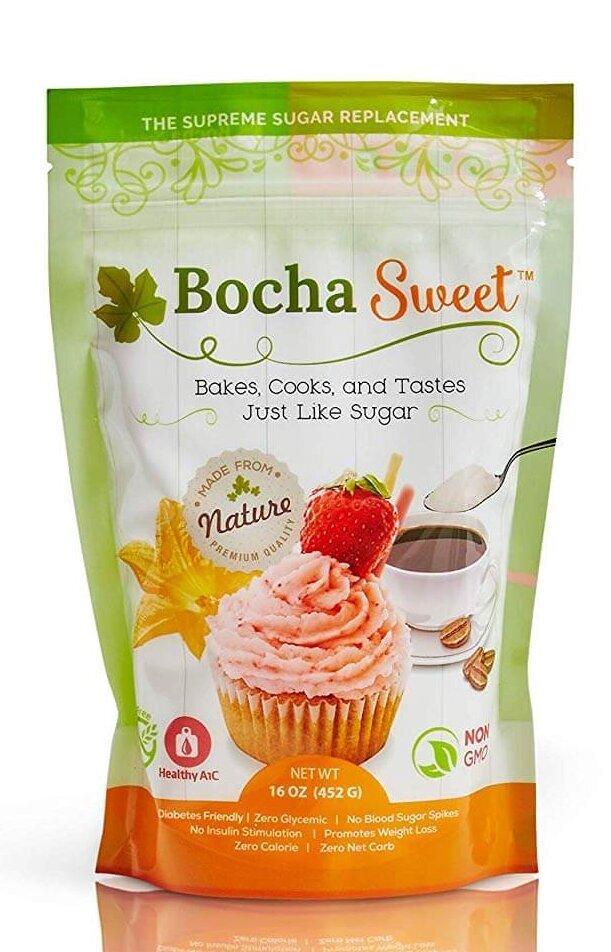
Bocha Sweet — Bocha Sweet is an extract from the Japanese Kabocha Pumpkin, which is considered a superfood. Bocha sweet has zero calories and is 100% plant-based with no fillers or additives. If you’re looking for a natural sugar substitute or trying to avoid sugar alcohols, Bocha Sweet is definitely worth a try!
The Breakdown on Bocha Sweet:
- Calories – 0
- Net Carbs – 0g
- What it’s made of – Kabocha extract
- Estimated Cost – High
Lakanto Sugar-Free Maple Syrup — It’s just not breakfast without some maple syrup, and that’s exactly why Lakanto’s Sugar-Free Maple Syrup made the honorable mentions list!
However, this is SO much more than just a breakfast topping! We use Lakanto sugar free maple syrup in low carb baked goods and even keto-friendly drinks!
Enjoy classic maple syrup flavor, but without any of the sugar! Much like Lakanto’s Monk Fruit Sweetener, this maple flavored syrup made with a mix of monk fruit, Erythritol, and other natural ingredients.
The Breakdown on Lakanto Maple Flavored Syrup:
- Calories – 0
- Net Carbs – 1g
- What it’s made of – Purified water, tapioca fiber, chicory root inulin, potato starch, sea salt, natural flavors, monk fruit extract, fruit juice (for color), natural citrus extract (preservative)
- Estimated Cost – Low – moderate
Allulose Sweetener — Allulose is a carbohydrate that is found naturally in foods such as jackfruit, figs, and even raisins. While it only exists in small amounts in those foods, it has since been extracted for wider use. One of the benefits to allulose is that it browns like sugar when cooking and baking, for a realistic flavor.
The Breakdown on Allulose:
- Calories – 1.6 (per teaspoon)
- Net Carbs – 0g
- What it’s made of – Allulose
- Estimated Cost – Moderate – High
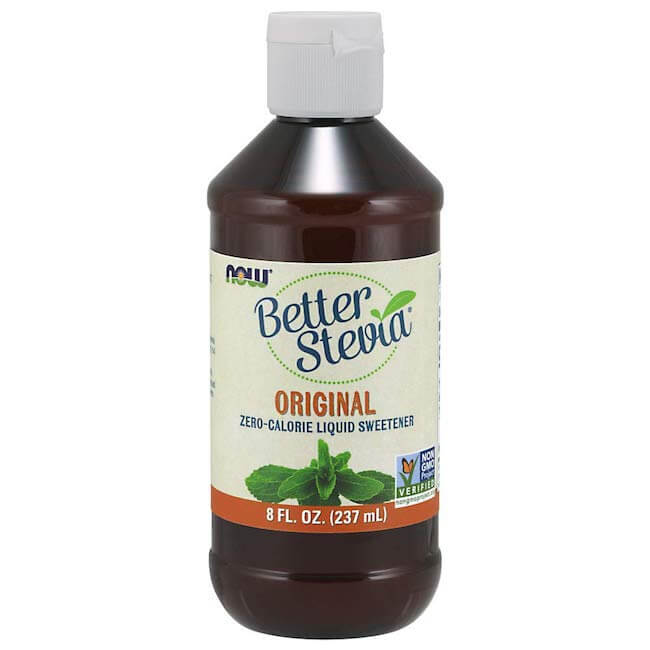
Stevia Extract — Derived from the stevia plant, stevia is one of the most popular natural sugar substitutes. We like stevia because it doesn’t cause side effects like sugar alcohols, however, some people do notice a slight aftertaste.
The Breakdown on Stevia Extract:
- Calories – 0
- Net Carbs – 0g
- What it’s made of – Stevia leaf extract (Water and/or alcohol may also be added as a base for liquid stevia extract, much like vanilla extract)
- Estimated Cost – Moderate – High
What is the Best Sugar Substitute for Baking?
We’ve used both Lakanto Monk Fruit Sweetener and all three varieties of Swerve (erythritol) in our keto baking recipes with excellent results.
Since they are both 1:1 sugar substitutes, monk fruit sweetener and Swerve are easy to measure. Both taste delicious and don’t alter the taste of our recipes. When used in moderation, neither one has caused digestive issues for us.
Another factor is the texture, and again, both monk fruit and erythritol are the winners when it comes to the right consistency.
Low Carb Sweeteners to Avoid
- Maltitol – A sugar alcohol which may cause gastrointestinal side effects such as gas, bloating, and diarrhea. Malitol is an inexpensive sugar substitute, which is why it is a common ingredient in low carb snacks, candy, etc. However, the side effects can be quite severe and in my opinion NOT worth it! I avoid malitol and sorbitol (see below) at all costs!
- Sorbitol – A sugar alcohol which may cause unpleasant side effects similar to maltitol.
- Sucralose – A sugar substitute (one of the brand names is Splenda) that has recently come under question for potential health risks, as it breaks down under high temperatures (as in baking) and may negatively interact with other ingredients.3
- Aspartame – While the American Cancer Society considers aspartame safe for human consumption, there is ongoing research into a potential link between aspartame and cancer.4 With so many better sugar substitutes available, why take the chance?
A Final Note on Keto Sweeteners
Just like any other type of food item, every individual will have their own experience with keto sweeteners and sugar substitutes.
Some low carb sweeteners may not cause any side effects for one person, while another person may experience them. Taste preferences will also vary of course.
We’ve offered our picks for best keto sweeteners based on personal experience and our own research. You may have to try a couple different options before you find the keto sweetener that works best for you. We hope you find this information helpful in your search!
Note: This post is for informational purposes only and not intended to be medical advice.
KETO FAQ – Learn More
- What is Keto?
- How many carbs can you eat on keto?
- Keto-friendly Food List
- What is the Keto flu and how to avoid it?
- What is a Targeted Keto Diet?
- 8 Reasons You’re Not Losing Weight on Keto
Sources:
- https://www.healthline.com/nutrition/monk-fruit-sweetener#weight-loss
- https://foodinsight.org/what-is-erythritol/
- https://www.healthline.com/nutrition/sucralose-good-or-bad
- https://www.cancer.org/cancer/cancer-causes/aspartame.html

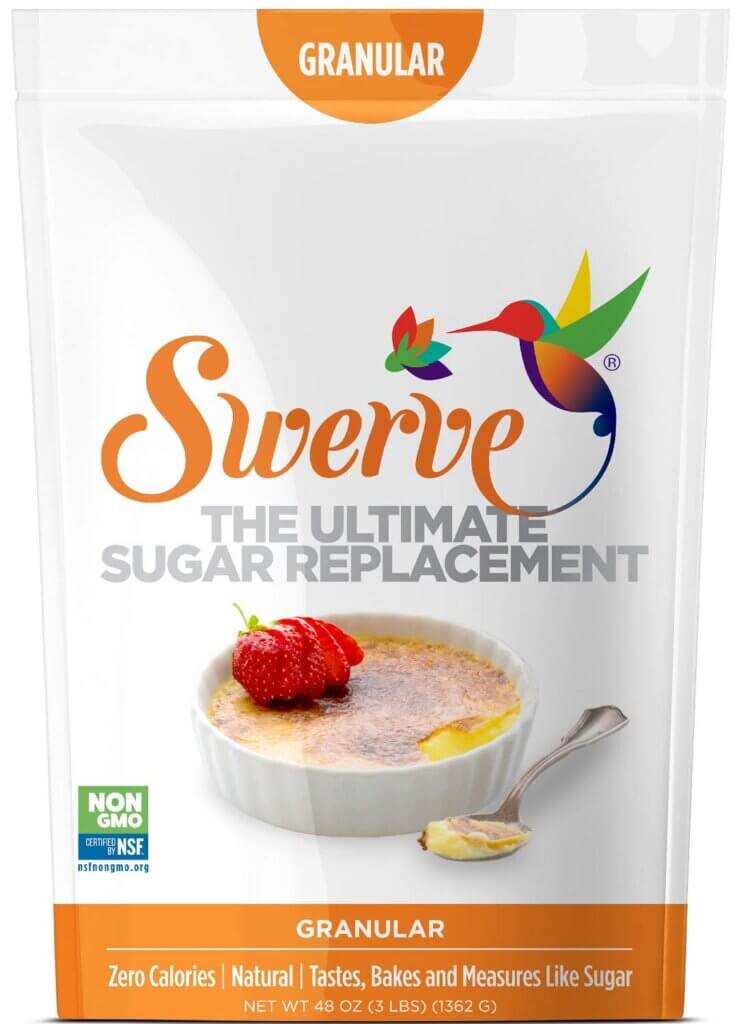
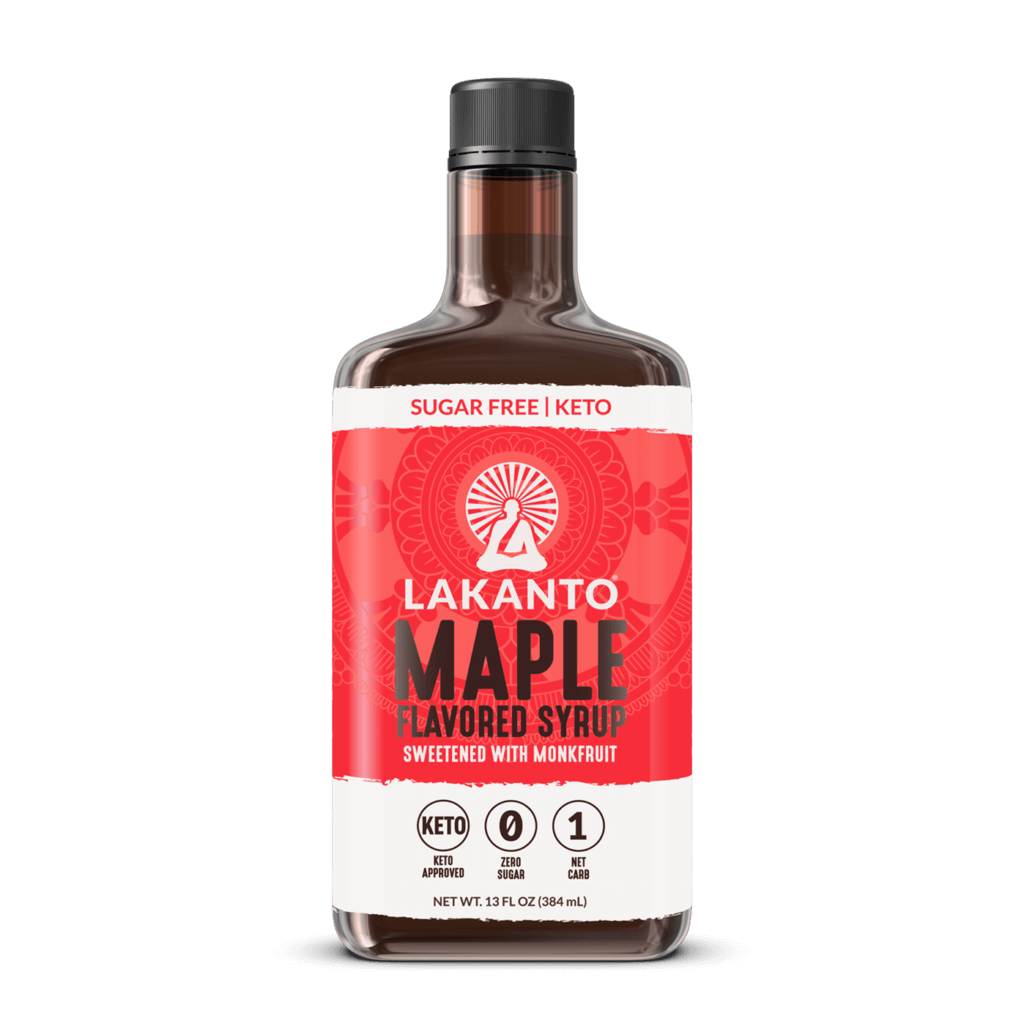
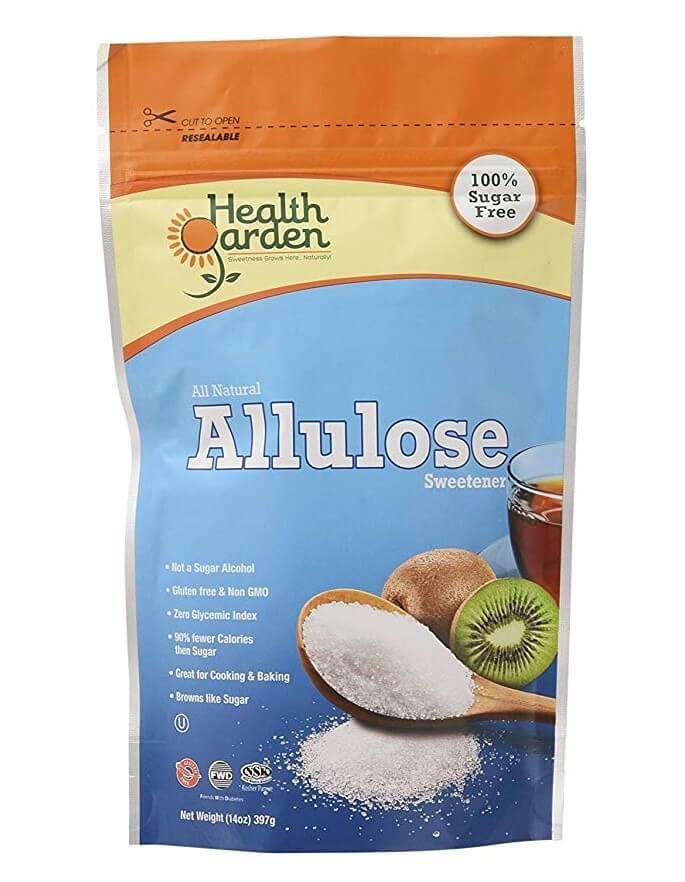

You had me, until I saw Lakanto’s Monk Fruit sweetener supposedly doesn’t have an aftertaste. Yes, everybody tastes things differently. we have a lot of people on the keto diet in our hospital. I have been taking an informal survey, and it’s 100%, that yes, it does have a definite aftertaste. Cooling effect. That’s out of 8 people so far. I was curious about Allulose, and Bocha Sweet. Guess I’ll have to buy them to know for sure.
Interesting! I haven’t noticed the cooling effect! My taste test was based on using the ingredients in recipes as opposed to just eating them by themselves., so perhaps that is the difference.
I keep seeing the statement that erithrytol tastes like sugar and has no aftertaste. That’s definitely not true. I bought 2kg of it for use in 2020 and it tasted awful. I thought the online source was dodgy and ordered another kilo from a rather expensive, but reputable store and it was exactly the same: annoying cooling effect which you have totally failed to mention, and the odd off taste. Monk fruit sweeteners on their own are quite expensive, but have no aftertaste. It’s the erythritol most brands add that give it the horrible aftertaste. And yes, I have taste-tested most of the them on family and friends! Please actually taste/use the products you write about.
Hi Stella – thank you for the feedback and I want to let you know that I am a real person and I do use the monk fruit brand that I recommended. To me, it does not have a strong aftertaste at all, though flavors can be subjective and I’ve heard some that think it does. Part of finding your favorite keto friendly sweetener is trial and error, and I’ve tried many, but all I can recommend is how I personally think they taste.
Becky Doude, the cooling effect in Lakanto (and other brands of monkfruit sweetener) is coming from the main ingredient, erythritol. My husband and I don’t mind it.
Allulose, though, is better. No aftertaste, and most of the allulose sweeteners have a little monkfruit in them to bring the sweetness level up to equal that of sugar, so you can measure one to one.
Hope that helps.
As much as I like Lakanto, it definately has a recognizable cooling aftertaste. I’m looking for an alternative too…planning to try allulose.